Mar 21, 2014
By All Measures
The National Survey of Student Engagement results can indicate the degree of academic challenge students perceive as well as their overall perceptions…
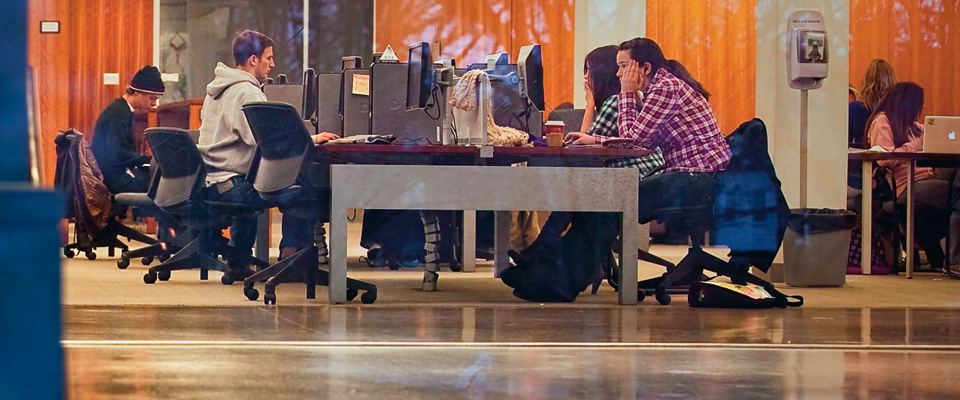 by Alan Finder | photography by Chuck Zovko
by Alan Finder | photography by Chuck Zovko
An introductory sociology class begins as it often does, with a writing assignment. The professor asks her students to consider questions related to their assigned reading, selections from Emile Durkheim’s major works: 1) Pick a community to which you belong: Briefly describe it and your role in it; 2) When have you broken a norm in this community? How did you know you broke it?; 3) What were the repercussions? What do those tell you about the community?
The students pick up their journals from a pile in front of the classroom and quickly get to work. For 10 minutes, the only sound is pens moving swiftly across paper. The exercise leads to a spirited discussion about conformity and deviance, group solidarity and the intended uses of punishment, and the social functions of deviance.
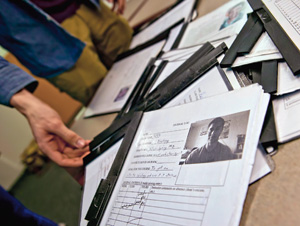 Caroline Lee, associate professor of sociology, has been teaching for nearly a decade and has led similar class discussions countless times. But only in the last few years has she made writing in journals a central part of each class in introductory courses such as this one, Anthropology and Sociology 103. Like many professors, she used to ask her students to respond to reading assignments on Internet platforms such as Moodle and Blackboard. But she grew frustrated with the superficiality of their responses; she says it was as if they were tweeting or posting something on Facebook.
Caroline Lee, associate professor of sociology, has been teaching for nearly a decade and has led similar class discussions countless times. But only in the last few years has she made writing in journals a central part of each class in introductory courses such as this one, Anthropology and Sociology 103. Like many professors, she used to ask her students to respond to reading assignments on Internet platforms such as Moodle and Blackboard. But she grew frustrated with the superficiality of their responses; she says it was as if they were tweeting or posting something on Facebook.
“The writing just didn’t seem to be very high quality,” Lee says. “Everything online is so compressed, everything is so digestible.”
She decided to search for new ways to engage her students more deeply, to encourage them to think and write more rigorously. By introducing writing in journals as an integral part of every class, she hoped they would learn “to reflect and think and maybe pause before writing.”
By introducing writing in journals as an integral part of every class, she hoped they would learn “to reflect and think and maybe pause before writing.”
The course reading can be challenging, with excerpts from dense classic sociological theory by Durkheim, Max Weber, Karl Marx, and others. Lee has found that the discipline of writing repeatedly in class has sharpened her students’ ability to read critically and think analytically.
“Those are not easy texts,” she says. “I say to them, ‘I want your brain to hurt. I expect your brain to hurt. And that’s OK. That’s why you are here, to stretch yourself.’”
At a top liberal arts college like Lafayette, faculty members passionately embrace their roles as teachers and are dedicated to close interaction with students. They employ myriad tactics to make students’ brains hurt, to challenge them, and to create what Jenn Stroud Rossmann, associate professor of mechanical engineering, calls “a culture of high expectations.” That involves setting ambitious standards and reinforcing them by continually inculcating intellectual rigor into the life of the College.
For James Ferri, James T. Marcus ’50 Professor of Chemical and Biomolecular Engineering, a primary goal is instilling “a kind of academic nimbleness” in his students. Joshua Sanborn, professor of history, speaks of teaching students how to “analyze and synthesize sets of complex information.” Lee Upton, professor of English, encourages a quality that she calls “advanced intellectual flexibility.”
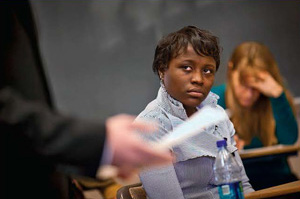 Professors use different terminology to describe the habits of mind they seek to nurture, and academic disciplines have differences of emphasis and nuance. But there is a common thrust in their efforts to promote serious intellectual standards.
Professors use different terminology to describe the habits of mind they seek to nurture, and academic disciplines have differences of emphasis and nuance. But there is a common thrust in their efforts to promote serious intellectual standards.
“The experience of going to college is to challenge how one has always thought, to develop the ability to question assumptions,” says Ian Smith, professor of English. “One of the things I emphasize to students all the time is that an education is not simply about the acquisition of knowledge. What really matters is how that knowledge can produce a transformative experience that students carry for the rest of their lives.”
In engineering and the natural sciences, academic rigor is often manifested in lab and class assignments. Students frequently work in teams, learning to share ideas and responsibilities and to solve problems as a unit—skills that are highly prized in the contemporary work world.
In Engineering Science 101, the first-year introductory course taken by all students who intend to major in engineering, students learn the process of engineering design. In a section taught by Rossmann, teams of students perform an exercise in which they reverse engineer common household objects: doorknobs, LED flashlights, dial scales. They take a device apart, try to determine how each part works, make accurate drawings, contemplate how the item might be improved, and then reassemble it.
 One team of three students in Rossmann’s class used a PowerPoint presentation to demonstrate the parts they found when they disassembled a simple bathroom scale, one with a dial instead of a digital readout. They detailed the use of each of several dozen parts—all but the two whose function they couldn’t figure out. They explained how the scale works, the way the main spring turns weight into distance moved, and how a rack and pinion mechanism then transforms that distance into the rotation of the scale’s dial.
One team of three students in Rossmann’s class used a PowerPoint presentation to demonstrate the parts they found when they disassembled a simple bathroom scale, one with a dial instead of a digital readout. They detailed the use of each of several dozen parts—all but the two whose function they couldn’t figure out. They explained how the scale works, the way the main spring turns weight into distance moved, and how a rack and pinion mechanism then transforms that distance into the rotation of the scale’s dial.
The discussion included an explanation of how the linear motion produced by the weight and spring gets transformed into a rotational motion, which moves the dial. The team assessed the scale’s strengths and weaknesses, among them its inability to weigh anyone or anything that is more than 330 pounds. They also described how difficult it had been to take the scale apart and then put it back together.
“The bar has definitely been raised a lot,” says Deborah List ’17, a team member who took a demanding International Baccalaureate curriculum while growing up in Boca Raton, Fla. She is finding it a challenge to adjust to the speed and rigor of college courses like this one.
“It’s very different,” she says, “but I’m liking the workload and the challenge.” She particularly enjoyed being introduced to new subjects such as design in engineering and has been inspired by her team-based assignments. “I love working in teams and pairs.”
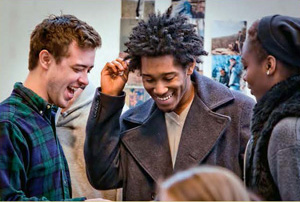 Another group in Rossmann’s class reverse engineered a Marina VI lockset, otherwise known as a doorknob. They were surprised at the complexity of the internal mechanism, and in their presentation they broke the device down into a number of subassemblies—turning, locking, latch, among others.
Another group in Rossmann’s class reverse engineered a Marina VI lockset, otherwise known as a doorknob. They were surprised at the complexity of the internal mechanism, and in their presentation they broke the device down into a number of subassemblies—turning, locking, latch, among others.
The students were concerned that, with at least 40 parts, the doorknob was sufficiently complicated that a homeowner would be hardpressed to disassemble it to replace a broken part. “It was really difficult to take apart,” a team member told the class, “and really hard to put together.”
Rossmann says it is vital for future engineers “to get the physical understanding of how something works.”
“We teach them a lot of skills, but our goal is to show them the importance of asking ‘why,’ why would you do this? Whose needs were met by this design? We’re trying to build in that habit of thinking critically.”
Recent graduates say they appreciate the habits of mind they developed at Lafayette and find the College’s emphasis on fundamentals and intellectual adaptability valuable now as they solve problems and accomplish tasks in a wide variety of fields.
Rufaro Mukogo ’07, a chemical engineering graduate, went to work initially as a Wall Street investment banker. After that, he earned a graduate degree in chemical engineering. Now he is calling on the skill sets of multiple disciplines in his current job with a commodities trading company in Houston, where he has been involved in crude-oil pipeline operations and risk management.
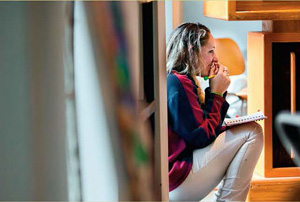 “I can be thrown into any situation, and I have the tools; I know what to do,” Mukogo says. “Many times it’s how you approach a problem, how you think about it. What I got from my experience at Lafayette is I can navigate things as they come up.”
“I can be thrown into any situation, and I have the tools; I know what to do,” Mukogo says. “Many times it’s how you approach a problem, how you think about it. What I got from my experience at Lafayette is I can navigate things as they come up.”
Enforcing ambitious academic standards often requires a kind of tactical shrewdness. Lee, for instance, does not grade her sociology students’ journal entries. “I want to ask them really hard questions, and I don’t want them to be filled with anxiety,” she says.
Lee collects the journals after every class. Reading the entries helps her determine which concepts the class is having difficulty grasping. The journal writing also reinforces the students’ sense of accountability with respect to completing the assigned reading, and Lee’s consistent interaction with students through this medium “helps me know them better.”
Among her primary goals, Lee says, is to teach students how to take an abstract idea and apply it to different contexts, a skill that could prove useful whether they go on to law school or medical school or pursue a master’s degree in business or social work.
Rammy Elrafei ’16, who plans to major in biology, found the emphasis on in-class journal writing quite helpful. “It pieces together the reading with what we’re learning in the lectures.
“I definitely feel challenged. I’m doing a lot of work,” Elrafei says of Lafayette’s academic climate. “I’m in the library all the time reading. And there is a lot of thinking I have to do about the reading. In high school things were spoon-fed to me more. Here I have to struggle to make connections on my own. It’s more difficult, but I like it.”
Katelyn Jones ’16, who plans to major in philosophy, appreciates the ways Lee and her other professors challenge students. “They really encourage you to think differently.” A course in American government inspired her to re-examine many of her assumptions. “That professor made me look at things I thought I knew in a different way,” she says.
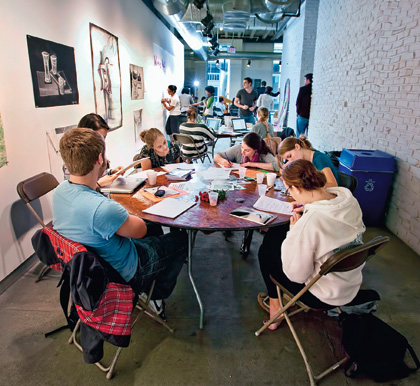 Committed teachers use many different techniques to deeply engage students. Smith administers an oral exam in his Shakespeare course about midway through a semester. Students read a play that has not been discussed in class. Each student prepares a 10-minute presentation, which he or she delivers separately to Smith in his office. He responds with follow-up questions, with each oral exam generally lasting about a half-hour.
Committed teachers use many different techniques to deeply engage students. Smith administers an oral exam in his Shakespeare course about midway through a semester. Students read a play that has not been discussed in class. Each student prepares a 10-minute presentation, which he or she delivers separately to Smith in his office. He responds with follow-up questions, with each oral exam generally lasting about a half-hour.
An independent study with Smith was a transformative intellectual experience for Taaha Mohamedali ’11, who majored in English and is now an assistant director of admissions at the College.
Together, they read The Merchant of Venice, going over the play line by line. They met six to eight hours weekly for a semester, examining with extraordinary rigor Shakespeare’s choice of words, the social context of his era, even the history of words the playwright used. Even after the course ended, they continued to work through the summer on ideas related to the research the play yielded.
“Of the five acts, we completed two,” says Mohamedali. “I learned how to read, not in a superficial sense, but in a deep, profound way. Reading now for me is a puzzle that needs to be solved. I cherish that course that I had with him. There is so much that I gained out of that experience.”
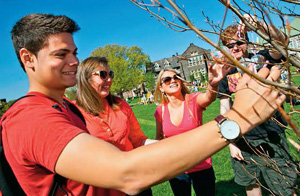 Engineering students nearly always stage a minor uprising late in the first semester of their junior year, Ferri says, questioning why they need to know the sophisticated mathematics that underlies the study of demanding subjects like continuum mechanics and heat transfer.
Engineering students nearly always stage a minor uprising late in the first semester of their junior year, Ferri says, questioning why they need to know the sophisticated mathematics that underlies the study of demanding subjects like continuum mechanics and heat transfer.
“I tell them we’re dealing with the ‘why’ as much as the ‘how,’” he says. “The creativity, the synthesis of knowledge, happens when you understand the theory.”
Writing, of course, has always played a significant role in college coursework, with papers, essay exams, and research projects reinforcing for students the value of reflection and articulation. In contemporary classrooms, however, writing has also become a major daily component.
At the beginning of class in Sanborn’s seminar on World War I, for example, students often write short, focused essays related to their assigned reading. He calls it “pre-writing.” Rossmann, too, often asks students to write in class about what they have read. As with Lee, this work isn’t graded.
Upton uses an array of inventive exercises in her creative writing course, in addition to requiring her students to write a poem or a piece of short fiction each week and read their work in front of the class. Many of the exercises are playful, and all of them are designed to nurture students’ intellectual flexibility, which is fundamentally how she defines academic rigor.
One afternoon, after Upton and her class read a clever poem titled “Q,” she handed the students cards, each with a single letter on it, and asked them all to write a poem based on their letter. “Surprise yourself,” she said. “Surprise the letter! What can you do to make it more vivid?”
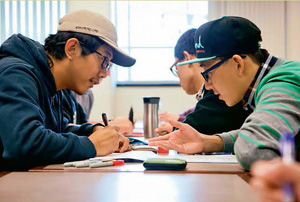 When the students read their poems, the results were surprisingly lively.
When the students read their poems, the results were surprisingly lively.
In another exercise, “Wreck-a-Poem,” students rewrite published works as bad poems. The idea, Upton says, is to figure out what makes a poem work and then “slaughter it.”
“The ultimate compliment is, ‘That was really terrible,’” she says.
The discipline, support, and sense of intellectual play all clearly appeal to students. So does Upton’s encouragement that they take chances—be bold—if they want to be intellectually nimble.
“For me, rigor is a progression of thought and a willingness to work,” says Izzy Connolly ’14, an art major in Upton’s class.
Classrooms like Upton, Rossmann, and Lee’s are just three examples of the way rigor is nurtured and reinforced across the curriculum at Lafayette. In an age that celebrates online education, when MOOCs— massive, open, online courses—are all the rage, people on liberal arts campuses like Lafayette remain committed to the indispensable value of personal interaction.
Faculty and staff members know they serve as role models of the personal and social responsibility that they seek to nurture in students. They expect students to take an active role in their own learning, and they are present so they can notice and take action if a student is struggling.
Sanborn says that most proponents of online courses “think that education is knowledge transfer.
“But that’s not actually how people learn. Human beings tend to learn their most valuable lessons in social contexts from mentors they respect. There’s something about being in the same room that counts.”
The National Survey of Student Engagement results can indicate the degree of academic challenge students perceive as well as their overall perceptions…
The following educational practices—all signature characteristics of Lafayette—lead to deep learning and engagement. Identified by George D. Kuh, Chancellors’…